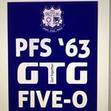Farouk Gulsara's Blog, page 23
July 20, 2024
At 6am, 6th June!
Director: Arkasha Robertson
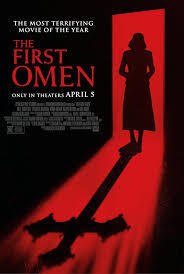 Recently, I heard about a mysterious case of a missing teenager in Rome, Italy. She was 16 in 1983 when she was allegedly abducted. Her father was an administrative staff member in Vatican City. 40 years into her disappearance, the Italian Police never found her. Along the way, there were allegations of abduction by international terrorists, murder by serial killers and many more. Pope John Paul II was also heard to have appealed to the perpetrators to no avail. The Holy See was not spared of accusations. Conspiracy Theorists accused a convoluted union of the mob and the Papacy, a collusion between the Italian Police and the Vatican, as well as the possibility of an unmarked grave in the Vatican.
Recently, I heard about a mysterious case of a missing teenager in Rome, Italy. She was 16 in 1983 when she was allegedly abducted. Her father was an administrative staff member in Vatican City. 40 years into her disappearance, the Italian Police never found her. Along the way, there were allegations of abduction by international terrorists, murder by serial killers and many more. Pope John Paul II was also heard to have appealed to the perpetrators to no avail. The Holy See was not spared of accusations. Conspiracy Theorists accused a convoluted union of the mob and the Papacy, a collusion between the Italian Police and the Vatican, as well as the possibility of an unmarked grave in the Vatican.It is not the best of times for the Roman Catholic Church (RCC). At a time when many from the developed world had strayed away from Catholicism, stories of deviance and malfeasance spread quickly like wildflowers.
This movie is set at a time when the RCC was losing its fervour. In 1971, a young nun-in-making, Margaret Daino, arrives in Rome to work in an orphanage. Margaret observes many strange things happening in the place. Many odd characters, such as senior clergy, use unconventional methods to run the institution. Margaret herself had a checkered past as a young American, moving from foster homes to foster homes and having visual hallucinations.
Margaret discovers that certain clergy members tried to reignite people's attraction to Christianity. How they chose to do it was twisted. They invoked Satan to be born as an anti-Christ here on Earth to create mayhem so that people would once again go to the Church and God for help. Little does Margaret know she was the vessel to bear this devilish child.
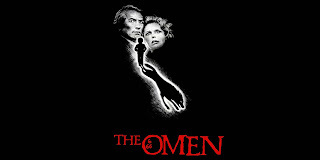 The movie is actually the prequel to the 1976 blockbuster The Omen, which told the story of the US Ambassador's wife who delivered a stillbirth. A baby boy was swapped in the place of the stillbirth without the knowledge of the mother. The swapped baby turned out to be the anti-Christ. The child, Damian, went on a killing spree, killing his parents, abetted by his disguised nanny.
The movie is actually the prequel to the 1976 blockbuster The Omen, which told the story of the US Ambassador's wife who delivered a stillbirth. A baby boy was swapped in the place of the stillbirth without the knowledge of the mother. The swapped baby turned out to be the anti-Christ. The child, Damian, went on a killing spree, killing his parents, abetted by his disguised nanny.In terms of horror and suspense, the 1976 version is far superior to the latest offering from the Omen franchise. Despite what IMDB may say about 'The Omen' being banned in Malaysia, I distinctly remember seeing its posters around Penang in my teenage years.

 This work is licensed under a Creative Commons Attribution 4.0 International License.This work is licensed under a Creative Commons Attribution 4.0 International License.
This work is licensed under a Creative Commons Attribution 4.0 International License.This work is licensed under a Creative Commons Attribution 4.0 International License.
July 18, 2024
Naysayers abound!
 It looks like we are still immersed in the euphoria of our recent close to 500km ride from Srinagar to Leh, Ladakh. Friends and well-wishers continue wishing their felicitations and, in not so many words, tell us to thank our lucky stars (or the Almighty) that we were still able to complete the crunching climb of 7,000 metres at this age.
It looks like we are still immersed in the euphoria of our recent close to 500km ride from Srinagar to Leh, Ladakh. Friends and well-wishers continue wishing their felicitations and, in not so many words, tell us to thank our lucky stars (or the Almighty) that we were still able to complete the crunching climb of 7,000 metres at this age. One of the fellow cyclists in the group did not take kindly to that phrase. He had put in so much effort throughout his life to keep fit. After leaving school and leading a more sedentary life, he decided to go back to his active ways after seeing his father suffering from various complications of diabetes.
From someone who jogged around the housing estate, he graduated to running long distances, hiking, and cycling. By a twist of fate, he found other fellow ‘madmen’ who shared his eccentricity amongst his neighbours.
Hence, he started the weekend sorcery of commitments to hiking, running, and cycling. The avalanche in the weekend noradrenaline rush was enough to keep the mind and body going over the week. All that came with a price, of course. He lost party-going friends, and he rarely got invited to functions. If the Cures were in love with Fridays, my friend was with the weekends.
 Saturday nights were not the time to indulge and party all night long. Family birthday functions soon became a chore as he kept looking at his watch when it was past 10 pm. He had to limit himself to that one drink, quickly becoming a wet blanket and a bore to others as he wanted to catch that well-needed nap before the early headstart the next morning.
Saturday nights were not the time to indulge and party all night long. Family birthday functions soon became a chore as he kept looking at his watch when it was past 10 pm. He had to limit himself to that one drink, quickly becoming a wet blanket and a bore to others as he wanted to catch that well-needed nap before the early headstart the next morning. Along the way, well-meaning, unwelcome advice from friends and relatives alike also came. They often quoted a seemingly healthy youngish so-and-so dropping dead like a fly after a trivial activity. And they would sow the seed of fear and uncertainty. Life is already unpredictable enough. Do we need these doomsday prophets to spread more confusion about what lies ahead of us?
He believed that deep inside, these people have an innate desire to dominate and suppress. Unable to see others doing things which push the boundaries of possibilities, they discourage others. Seeing someone slimming down will pop their antennas to suggest diagnoses such as diabetes or occult cancer. They jump to offer a shoulder to cry on the moment you get diagnosed with a chronic illness. On the sly, they are happy you are sick. They have one negative point to run the other down over. It looked like they loved to see others sick. They must have been vultures in their past lives, patiently waiting for the dead to breathe their last breath before they devour.
So when these people congratulate you for work well done, they were the same people who gave you anxiety, questioning your whole trajectory of life as well as throwing a spanner into your well-thought path to self-improvement. Remember not to sneer at them, as no one knows what lies ahead. They may actually have the last laugh and say, "I told you so!"



 This work is licensed under a Creative Commons Attribution 4.0 International License.
This work is licensed under a Creative Commons Attribution 4.0 International License.This work is licensed under a Creative Commons Attribution 4.0 International License.
July 17, 2024
Stop, Look, Think...
 Stop, Look, Think!
Stop, Look, Think!By Farouk Gulsara
Here I am, waiting in my car, clutching my steering wheel. It has been a good five minutes, and I am at a standstill. There are no vehicles in front of me. It is a T-junction with traffic lights. There is no traffic on either road, but I have no choice. I have to wait.
https://borderlessjournal.com/2024/07...


 This work is licensed under a Creative Commons Attribution 4.0 International License.
This work is licensed under a Creative Commons Attribution 4.0 International License.google.com, pub-8936739298367050, DIRECT, f08c47fec0942fa0This work is licensed under a Creative Commons Attribution 4.0 International License.
July 15, 2024
A rescue mission that almost never happened!
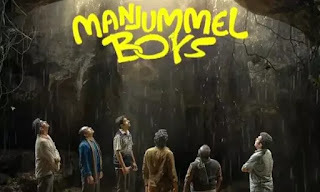 I was intrigued by this movie after reading two articles. The first detailed a legal dispute between Ilaiyaraaja's side and the producer. The dispute arose when the producer used Ilaiyaraaja's song composition as a background without obtaining permission. This incident added an exciting layer to the movie's production. The second article discussed the Tamil Nadu Home Secretary's directive to the Kodaikanal Police to investigate police brutality against complainants, which also played a role in the movie's plot.
I was intrigued by this movie after reading two articles. The first detailed a legal dispute between Ilaiyaraaja's side and the producer. The dispute arose when the producer used Ilaiyaraaja's song composition as a background without obtaining permission. This incident added an exciting layer to the movie's production. The second article discussed the Tamil Nadu Home Secretary's directive to the Kodaikanal Police to investigate police brutality against complainants, which also played a role in the movie's plot.This is a gripping tale of a rescue mission that took place in 2006. A group of young men from Majummel, Kochi, embarked on a trip to Kodaikanal in Tamil Nadu, a popular tourist destination. While exploring, the men made a fateful decision to venture into a restricted area. Tragically, one of them fell into a seemingly bottomless pit. The story unfolds as the remaining men, faced with a group of apathetic officials who had essentially given up on their friend, embark on a daring mission to rescue him.
This survival thriller is based on actual events. The cave the young men entered has a long and checked history. It was first described in 1821 by a British officer who christened it 'Devil Kitchen'. It caught people's attention when it was featured in 1991 Kamalhaasan's hit movie, 'Guna'. Since Guna, a mental patient in the film, used this cave as his hideout, it came to be referred to as 'Guna's Cave'. A catchy song from the movie, 'Kanmani Anbodan,' is used liberally in this movie and has become a bone of contention with Illayaraaja's camp.
As many as 16 victims have plunged into the pit in Guna's Cave, but none have been rescued. Even a Central Minister's relative had fallen into this hole. All the available resources could not rescue or not so much excavate his remains.
 Roots of Guna Caves ©Shutterstock So, when the Majummel Boys ran to the Kodaikanal Police for help, the police were not too enthusiastic in carrying out rescue missions, looking at the cave's track record. In fact, they were beaten up, accusing them of trying to cover up a murder. The fire and forest departments were not helpful either. No officials dared to go in hoisted on ropes with so many urban legends floating around. Long story short, the boys and the local people hawked on the police and rescue teams. One of the Manjummel Boys, Kuttan (Suji David), volunteered to go in. After many tense moments, the victim (Subhash) was found alive and rescued. Kuttan went on to receive a State award for bravery. Subhash remains the only person rescued after plunging into the hole in Guna Caves.
Roots of Guna Caves ©Shutterstock So, when the Majummel Boys ran to the Kodaikanal Police for help, the police were not too enthusiastic in carrying out rescue missions, looking at the cave's track record. In fact, they were beaten up, accusing them of trying to cover up a murder. The fire and forest departments were not helpful either. No officials dared to go in hoisted on ropes with so many urban legends floating around. Long story short, the boys and the local people hawked on the police and rescue teams. One of the Manjummel Boys, Kuttan (Suji David), volunteered to go in. After many tense moments, the victim (Subhash) was found alive and rescued. Kuttan went on to receive a State award for bravery. Subhash remains the only person rescued after plunging into the hole in Guna Caves.This movie is a visual treat, with stunning cinematography that captures the beauty and danger of the cave. The camera work effectively conveys the tension and fear experienced by the characters, adding to the overall suspense of the film.


 This work is licensed under a Creative Commons Attribution 4.0 International License.
This work is licensed under a Creative Commons Attribution 4.0 International License.
google.com, pub-8936739298367050, DIRECT, f08c47fec0942fa0This work is licensed under a Creative Commons Attribution 4.0 International License.
July 12, 2024
Between words and actions!
 When I was young, Amma thought I was a disappointment. In her mind, she felt that children had to be loud, commanding and cocksure about everything - not, like her son, passive, agreeing to most everything and giving too much space for the benefit of the doubt.
When I was young, Amma thought I was a disappointment. In her mind, she felt that children had to be loud, commanding and cocksure about everything - not, like her son, passive, agreeing to most everything and giving too much space for the benefit of the doubt. She would often quote that this neighbour's son is brilliant and speaks well, that the neighbour's kid is doing well in school, and that I should pick a cue or two from them to succeed in life. Actually, she was more colourful in expressing her disappointment.
The truth of the matter is, in my opinion, most domineering mothers give rise to submissive children. It is not so much that it is genetically coded; it is a case of conditioned nurturing.
AAmma'smantra is that to succeed in life, one has to have confidence and the gift of the gab. Her tough childhood in post-WWII Malaya made her and her siblings acquire the enviable skills of street smartness and the ability to sell ice to Eskimos.
Like the eyes, the mouth and the words it expresses are the window to what lies within the soul. One must be articulate to capture hearts in interviews and win arguments or elections. My siblings and I miserably disappointed Amma in that department.
I do not think there is any wisdom in Amma's view of the world. Two contemporary examples took my thoughts back.
The present PM was such a good orator that everybody in the country thought he was the solution to all the nation's problems. Conveniently, the then PM then had scandals after scandals that he tried to push under the carpet. Naturally, the current PM was given the mandate to take the realm. Two years into his leadership, everyone can see he can talk much better than he can rule.
 The first round of the US Presidential Debate had started. Democrats and Republicans agree that it was a sad state of something hardly resembling a debate. Trump did not have to draw his trademark tirades against Biden but wait for him to fumble and mumble. If articulation and verbosity were so crucial in convincing voters, what did the Democrats think when they agreed to allow a senile and obviously ill Biden to take the rostrum?
The first round of the US Presidential Debate had started. Democrats and Republicans agree that it was a sad state of something hardly resembling a debate. Trump did not have to draw his trademark tirades against Biden but wait for him to fumble and mumble. If articulation and verbosity were so crucial in convincing voters, what did the Democrats think when they agreed to allow a senile and obviously ill Biden to take the rostrum? Action speaks louder than words. If Modi's modus operandi were anything to go by, an effective leader must work below the surface, calculating and executing his moves without having multiple press releases and public declarations of intent. He must be seen doing things, not just talking or at least walking the talk.
On a sobering note, my siblings and I have not done too poorly for ourselves. The people that Amma asked to emulate and look up to as role models did not end up meeting Amma's expectations in adulthood.

 This work is licensed under a Creative Commons Attribution 4.0 International License.
This work is licensed under a Creative Commons Attribution 4.0 International License.This work is licensed under a Creative Commons Attribution 4.0 International License.
July 7, 2024
The movie Disney and China do not want you to see.
Kundun (1997)
Director: Martin Scorsese
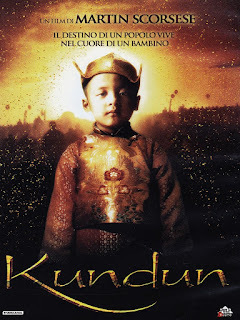 Even though this movie is honoured with a string of accolades, it does not ring a bell. There is a legitimate reason for this. Disney regrets financing this movie and considers it their greatest faux pas. They kept the film in cold storage and only had limited screenings in the US. Disney did not promote this movie commercially. It was at the time when Disney was trying to venture into mainland China with the plan to build a Disney theme park there.
Even though this movie is honoured with a string of accolades, it does not ring a bell. There is a legitimate reason for this. Disney regrets financing this movie and considers it their greatest faux pas. They kept the film in cold storage and only had limited screenings in the US. Disney did not promote this movie commercially. It was at the time when Disney was trying to venture into mainland China with the plan to build a Disney theme park there.After making a string of Mafia movies, Scorsese wanted to make one about something close to his heart - tackling the true story of the 14th Dalai Lama. After making the movie, Disney discussed their plans with CCP regarding Disney Park, and they were informed that China was infuriated about the film. In the Chinese eyes, Disney was interfering with China's internal affairs. Tibet was Chinese territory, and the Dalai Lama was a dissident who wanted the region to break away. Making a film sympathetic to his course, the Chinese thought was in bad taste.
Disney attempted damage control for fear of hurting the CCP and destroying the prospect of expanding into the Chinese market share. They produced and promoted the 1998 Mulan to showcase their genuine intention of valuing Chinese culture.
26 years after being stuck in the vaults, Kundun recently emerged on YouTube for all to view to their heart's content. Kundun is the affectionate name of the first Lama was referred to.
The film is a cinematographic galore of the supposed landscape termed Shangrila, the paradise on Earth. Surprise, surprise. The filming was done entirely in Morocco and a Buddhist monastery in New York.
The film starts in 1937 with the lamas going in search of the special child destined to be the next Dalai Lama. After elaborate tests, they determine their child. The child grows up in the monastery, learning text, chanting, and praying. He has no special powers; he is just a normal person put in an important position to make essential decisions.
As the boy matures into teenagehood and adulthood, he realises that significant responsibilities are placed on his shoulders. No divine revelations fall from the sky for him to decide. All he can do is think, discuss with others, get their opinions, pray, and make up his mind, hoping for the best outcome.
He realises that he is not infallible and has made some wrong calls.
It is the worst of times. It is 1949, and Mao Tse Dong and the Communist Party of China are walking into Tibet. The Dalai Lama is seen as a divine leader of the Tibetian people, but his brand of consultative diplomacy is not working to protect his people. Things become too heated up. The Dalai Lama's shoestring army advised him to abdicate to India and continue his work in Tibet another day. This film is more of a historical account of how the 14th Dalai Lama ended up in his current sojourn, Dharamsala, in Himachal Pradesh.
As the Dalai Lama reaches the Indian border after a treacherous journey, he is greeted by an Indian soldier, which essentially summarises who the Dalai Lama is all about.
"I think that I am a reflection, like the moon on water. When you see me, and I try to be a good man, you see yourself."
 This work is licensed under a Creative Commons Attribution 4.0 International License.This work is licensed under a Creative Commons Attribution 4.0 International License.
This work is licensed under a Creative Commons Attribution 4.0 International License.This work is licensed under a Creative Commons Attribution 4.0 International License.
July 5, 2024
Heal thyself!
Author: Adam Kay
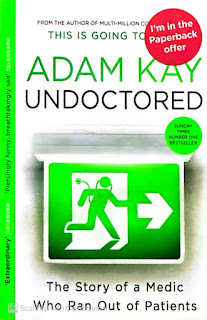 There used to be a time when only the crêmê à la crêmê would be handpicked from public examination scorers to study medicine in state-sponsored medical schools. The competition to be admitted as a medical student was so keen. Entrance would mean assured employment by the State, together with the prestige, perks and elevation of social status to the family that came with it. That is what everyone thought, anyway.
There used to be a time when only the crêmê à la crêmê would be handpicked from public examination scorers to study medicine in state-sponsored medical schools. The competition to be admitted as a medical student was so keen. Entrance would mean assured employment by the State, together with the prestige, perks and elevation of social status to the family that came with it. That is what everyone thought, anyway.A career in Obstetrics used to be considered quite noble. Doing the work of a stork, being there, and bringing joy via new birth was considered honourable. The team did not mind the long hours and gruelling work conditions, as they were muffled by the lustful cry of a newborn and wiped clean by the tears of joy of a parturient mother.
Again, it is fulfilling no more.
What was a noble and fulfilling profession became a pressure cooker. A patient walks into a consultation room, wanting hassle-free relief from his pre-existing ailment. He wants 100% relief, not accepting that morbidity and mortality are realities of life. At the same time, he is wary that he may be taken for a ride, given a suboptimal treatment, and, if money is involved, be fleeced of his hard-earned money.
The medical practitioner, on the other hand, considers the patient a potential legal liability. He must ensure all the ‘t’s are crossed, and the ‘i’s are dotted. He must run a battery of tests to ensure nothing is missed or left that lawyers will later accuse of medical negligence.
In this background, Dr Adam Kay, a doctor in the ward, found the hard way that the system is toxic. It does not bother the practitioners or the attendants. They are left to deal with their own problems, grief and shortcomings. Dr Kay’s partner had a miscarriage, which he had to deal with himself. The system asked him to put his emotional baggage aside and work.
He left his overalls and stethoscope for a career in standup comedy and scriptwriting. He soon discovered his true sexuality. In a genuinely comical way, laced with lots of sarcasm, he describes all the going on in his life, good and bad, all in one bag of laughs. Sometimes, he goes philosophical about human life and why we are here. A good read.

 This work is licensed under a Creative Commons Attribution 4.0 International License.
This work is licensed under a Creative Commons Attribution 4.0 International License.
This work is licensed under a Creative Commons Attribution 4.0 International License.
July 3, 2024
God's great plan?
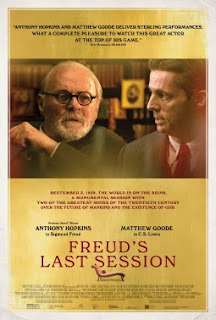 The day was September 3rd, 1939. Sigmund Freud was homebound in his house in London. He had fled Vienna to London and was nursing the constant nagging pain caused by his oral cancer and an ill-fitting oral prosthesis. Neville Chamberlain had declared war on Germany after Hitler failed to withdraw from Poland. Londoners stayed glued to their radios, bemoaning that the war had started again and were waiting for their leaders' latest instructions and progress.
The day was September 3rd, 1939. Sigmund Freud was homebound in his house in London. He had fled Vienna to London and was nursing the constant nagging pain caused by his oral cancer and an ill-fitting oral prosthesis. Neville Chamberlain had declared war on Germany after Hitler failed to withdraw from Poland. Londoners stayed glued to their radios, bemoaning that the war had started again and were waiting for their leaders' latest instructions and progress.Anxiety was high, and people were wondering how the next few days would be. Against this background, Sigmund Freud was spending the last few months of his life. He was in constant pain, needing morphine, but lucid enough to remember the life he had and to debate his favourite topic, the existence of God.
It is said that on that fateful, it is believed that he had a visitor by a Professor from Oxford University. The visitor's identity was not found, but the screenwriter decided to place CS Lewis as the guest.
Lewis grew up a Christian until his mother died when he was a young child. His depressed father lost all trust in Christianity and sent Lewis and his brother to a boarding school. CS Lewis was an atheist by the time he became a young adult. A short stint in WWI drew him to Christianity again, and he became an unapologetic Christian. In Oxford, he teamed up with JRR Tolkien through fiction work, and through their group Inlking, they emphasised the value of fantasy and narrative fiction. Lewis is famous for 'Narnia' and Tolkien for 'Lord of The Rings'.
Freud was born into an Orthodox family. In his childhood, he used to follow his nanny to Church. His father was not too happy about this, and he sacked his nanny for 'converting' Sigmund to Christianity. By adulthood, Sigmund Freud was a full-fledged atheist who thought that organised religion was a fraud.
The fictional meeting of these two great minds is the crux of this film, which was initially a stage show. It was a sort of Freud's last psychoanalysis session. Both men open their hearts, talking about their childhood, their relationships with their fathers, and intense debate about the existence of God.
Along the way, Anna's (Freud's daughter) pathological attachment to her father is discussed. Her sexuality takes centre stage, too. She was thought to be a lesbian. The question of God condemning his people for wrongdoings and criminalisation of pleasure, whether masturbation, casual sex or same-sex union, comes up. And where is God's place when Man is cruel towards each other?
After a long afternoon of discourse, both gentlemen take leave. Anna arrives home to introduce her partner, Dorothy, to her father. Anna goes to become the founder of child psychology. Freud died by assisted suicide, with the help of his doctor, a few weeks later.
Freud's meeting with the Oxford Don on September 3rd 1939, was Freud's last session.

 This work is licensed under a Creative Commons Attribution 4.0 International License.
This work is licensed under a Creative Commons Attribution 4.0 International License.This work is licensed under a Creative Commons Attribution 4.0 International License.
July 1, 2024
Under the radar
Director: Jin Ong
 When you wander around the wet markets or back lanes of many major cities, you find a buzzing economy independent of the one considered by economists and the national budget. There is a parallel economy going on there.
When you wander around the wet markets or back lanes of many major cities, you find a buzzing economy independent of the one considered by economists and the national budget. There is a parallel economy going on there. You see many moving around, working intensely, and doing things others think are dirty, dangerous and demeaning. You see people washing dirty dishes at the back of the restaurant, slaughtering chickens and carting around loads of vegetables or sundry goods. They are invisible to most people's eyes. And they are paid a pittance in cash. These transactions are not recorded; hence, they escape the revenue departments. They are voiceless and live below the radar because, on paper, they are persona non grata. They may be undocumented foreign workers, economic migrants who overstayed or refugees. Intertwined in this group are Malaysian citizens themselves, who, at birth or due to other reasons, did not have their birth registered at the National Department.
In the eyes of the State, they are not identified in the country's statistics and do not enjoy the privileges proffered to its citizens, like opening a bank account, being part of the cashless society, obtaining a passport, or even getting into schools. What is worse is being disabled on top of all this.
Abang and Adik found themselves as unwanted kids wandering the backstreets of Pudu, Kuala Lumpur. Abang took it upon himself to be Adik's guardian, and together, they grew into adults, just moving along with time.
Abang, hearing impaired, leads a straight life, working odd jobs and saving every sen in a biscuit tin under his bed. Adik is the 'adventurous' one. He dabbles with the thugs around town, cheating illegal immigrants of their hard-earned and moonshining as a gigolo. They rent a room in a debilitated flat which had seen better times a long time ago, now occupied only by illegal immigrants. This place is periodically raided by the immigration officers to fulfil a quota of detaining undocumented immigrants. Abang and Adik would be rounded off, too, but would be released later. Their closest friend is a transgender person who took them as their son.
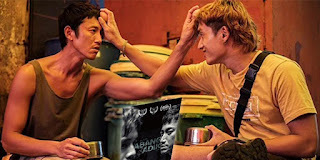 An NGO worker who goes beyond her call of duty to get them their legal papers helps them out. She somehow manages to locate Adik's father and invites him to meet his estranged father. Unfortunately, Adik's resentment of their father leads their conversation into a hearty argument that does not end well.
An NGO worker who goes beyond her call of duty to get them their legal papers helps them out. She somehow manages to locate Adik's father and invites him to meet his estranged father. Unfortunately, Adik's resentment of their father leads their conversation into a hearty argument that does not end well. In the meantime, Abang has developed a soft spot for a Myanmarese girl who will eventually be relocated to the US under the UNHCR relocation programme.
The last twenty minutes of the movie are the most gripping moments of the movie. The movie's most striking scene is when Abang has a 'conversation' with a Buddhist priest. When told by the priest to look at life positively, Abang, in sign language, has a long monologue, lamenting the life he has led, the hardship he went through, the parental love he never got, and, to top it off, the handicap he never asked for. Definitely worth a watch. 4.5/5. Worth the accolades it received.


 This work is licensed under a Creative Commons Attribution 4.0 International License.
This work is licensed under a Creative Commons Attribution 4.0 International License.
This work is licensed under a Creative Commons Attribution 4.0 International License.
June 29, 2024
All snuffed out?
 Look at the literature on senile dementia. Invariably, the first thing to be mentioned about managing these patients is discontinuing statins. Funny. I remember a time not too long ago when statins were hailed as the greatest of human inventions, after sliced bread, of course. Some even advised starting statins prophylactically after turning 40. Besides its coronary vessel-sparing effects, statistics then proposed protection against fractures and reduced incidences of bowel cancers.
Look at the literature on senile dementia. Invariably, the first thing to be mentioned about managing these patients is discontinuing statins. Funny. I remember a time not too long ago when statins were hailed as the greatest of human inventions, after sliced bread, of course. Some even advised starting statins prophylactically after turning 40. Besides its coronary vessel-sparing effects, statistics then proposed protection against fractures and reduced incidences of bowel cancers.Something so good had suddenly gone over to Dark Side? If one loves long enough to be afflicted with dementia, wouldn't he also be having raised cholesterol, cardiac events and the gamut? Now comes the chicken and egg story. Did the statins precipitate loss of neural functions as the whole 3kg brain is nothing more than a lumpen of fat?
Why am I even not surprised that only after two years of decriminalising cannabis, basically to draw in tourist dollars, it has taken a 180-degree turn. The Thai authorities must have realised that it was all wrong. Now, they want to reserve marijuana for medicinal uses only, under prescription and supervision.
This thought has plagued me since childhood. At six, my father brought me to the race club. I remember getting all excited seeing all those majestic horses run. It must have left a strong impression on my young mind that I became excited when a prancing horse reel appeared on our home 16" black-and-white TV. That is when the fight started. My father must have had quite an earful—one for attending the turf club and, second, for bringing a six-year-old there.
Why is it so readily available for everyone if going to the races is wrong? In the same manner, my mother told me that it is wrong to smoke and indulge in intoxicants. But then, I saw both my grandfathers in a perpetual state of inebriety with beedis or other unfiltered cigarettes slipped between their fingers. Well, that is the schizophrenic world we live in, I soon realised.
If we look back at history, mankind has been yo-yo-ing between promoting and banning intoxicants, between party time and prohibition.
When sailors returned from the New World with leaves that could be smoked, people thought that that would be their new plaything. They thought it was fantastic. Then they realised it gave them nasty coughs. By then, it was too late. They were hooked. The natives back in the New World never had this issue as smoking was customary, not a leisurely activity.
When Europeans brought in the technique of distillation of alcohol from the Islamic Empires, the Europeans discovered drunkenness, bumps and cirrhosis. The Aztecs chewed coca leaves to give vitality. Europeans thought heroin was the panacea for all ailments from fibromyalgia to insomnia and alcohol addiction!
When William of Orange wanted to balance his trade with France, he thought the most novel way to do that was for the British to brew their own gin. This led to the Gin Craze and a generation of abandoned children because their mothers were too high to let their babies suckle. To offset this, a gin tax was instituted by the mid-18th century.
People have short memories. By the mid-19th century, in the Victorian Era, it was hip again to be seen in gin palaces. This was compounded by the fact that gin and beer were cleaner than drinking water, as the sanitation system was non-existent in London. The Thames was an open sewage stream. The flamboyant drinking palaces fizzled out under the weight of drunkards and their disorderly behaviour.
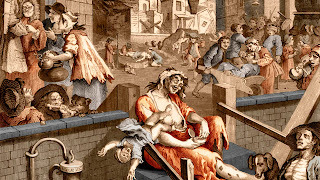 Gin Craze in LondonOpium was an exotic Eastern product that made its way into Europe. It became a status symbol to be indulging in a bit of weed every now and then. It was customary for artists, writers, poets and even Sherlock Holmes to be on snuff. In their stately duties in the Empire, the British East India Company was actively growing them in India to balance their trade with China. They also flooded the Chinese market with cheap opium and turned the Chinese population into opium addicts, which they successfully did. Their misdeeds finally caught up with them to bite them at their posteriors.
Gin Craze in LondonOpium was an exotic Eastern product that made its way into Europe. It became a status symbol to be indulging in a bit of weed every now and then. It was customary for artists, writers, poets and even Sherlock Holmes to be on snuff. In their stately duties in the Empire, the British East India Company was actively growing them in India to balance their trade with China. They also flooded the Chinese market with cheap opium and turned the Chinese population into opium addicts, which they successfully did. Their misdeeds finally caught up with them to bite them at their posteriors.So, it is a cycle. People will hail intoxicants, and then the ill effects will manifest. People will suppress them, only to forget all about them later. Rinse and repeat. We are just caught in the eternal cycle like a dog chasing its tail. For the record, one theory postulates that the inhabitants vanished without a trace because they were all addicted to soma.

 This work is licensed under a Creative Commons Attribution 4.0 International License.
This work is licensed under a Creative Commons Attribution 4.0 International License.
This work is licensed under a Creative Commons Attribution 4.0 International License.

